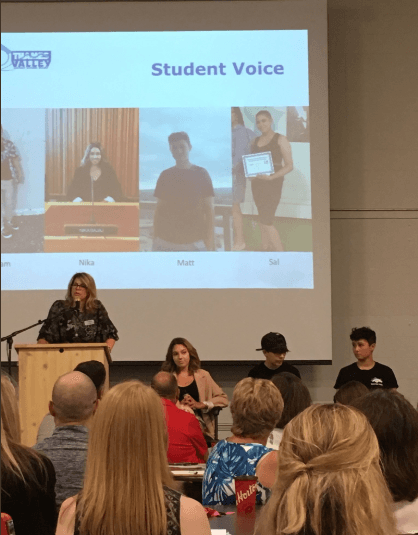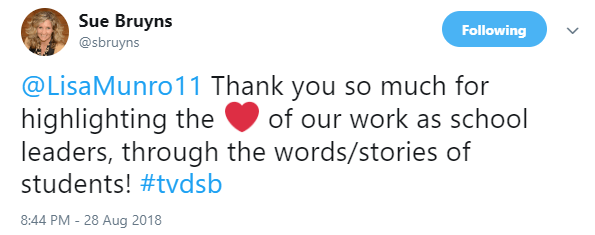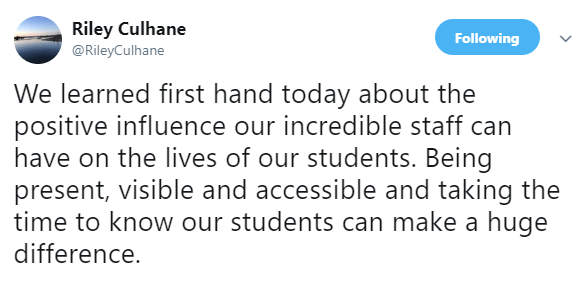 I recently had the opportunity to listen to a student panel of four remarkable students. They shared some of their personal stories in the context of the complex and exciting work of equity. Each student described their path/struggles at school and a staff member who made a positive impact in their life. Their stories helped to frame the WHY behind our need to create safe and equitable spaces in our schools and reminded us of WHO is in front of the daily decisions we make as school and system administrators. The students’ honest and optimistic messages highlighted that the actions of educators, both large and small, have impact. In fact, the impact they had in the room that morning was almost palpable. I personally left the meeting feeling incredibly optimistic about work of equity and inclusion in my role.
I recently had the opportunity to listen to a student panel of four remarkable students. They shared some of their personal stories in the context of the complex and exciting work of equity. Each student described their path/struggles at school and a staff member who made a positive impact in their life. Their stories helped to frame the WHY behind our need to create safe and equitable spaces in our schools and reminded us of WHO is in front of the daily decisions we make as school and system administrators. The students’ honest and optimistic messages highlighted that the actions of educators, both large and small, have impact. In fact, the impact they had in the room that morning was almost palpable. I personally left the meeting feeling incredibly optimistic about work of equity and inclusion in my role.
This opportunity left me reflecting on the power of student voice. Student voice is so incredibly impactful yet, after listening to the student panel, I considered that there are more ways that I could use student voice effectively in my role. Often, student voice is heard with good intentions but converting their words into meaningful actions is where there is much room for growth. Our realities often get in the way and daily actions are impacted by mood, bias, multiple demands for time, urgent needs, deadlines, events from our personal lives, quality of sleep or even the weather to name a few.
How can we keep students and their ideas at the centre of the decisions we make? There is no doubt that many things will influence our actions but there are ways to keep students at the forefront. Since humans are influenced by what we are most connected to, keeping students in our line of sight can help to ensure that they are at the centre of our decisions. Consider the following:
Engage in diverse student voices. Some students naturally rise to opportunities to share their voices. What about students who are not predisposed to typical leadership opportunities? These are the voices we need to hear. Educators need to support students who are underrepresented in conversations by ‘lifting up’ their voices. We need to reflect on how we draw upon the voices and realities of our students to make responsive decisions in our schools because not all voices need to be heard in the traditional sense of the word.
Connect with students regularly in different settings. As a principal it means intentionally booking time each day, even with the multiple demands for our time, to walk through the school, visit classrooms or interact with students during recess or during inter-curricular activities. So much can be learned from students during both structured and less structured times in the day.
Invite students to participate in ‘adult’ meetings where decisions are being made on their behalf. Students can be incredible agents of change. Often they do not see the barriers that adults can see and are able to solve seemingly complex problems with the most creative and often simplest solutions. Student insights are astounding and who knows better about what a student needs than the student.
Get to know students by name (and how to pronounce it correctly). Speaking to a student by name changes the dynamic entirely and often helps to create a connection that may lead to an open dialogue. If you don’t know how to pronounce a student by name, just ask.
Get to know a student’s story. Understanding who a student is and their story is one step to building a genuine con
nection. When you are connected to a student they are more likely to engage and share their voice.
See students as School Leaders. At my most recent school many assemblies, some clubs and all morning announcements were student-led. This cultivates student leadership and engages the student body in meaningful ways. Think of the traditional forms ways things are lead and how students can be incorporated more.
Be explicit about how their voices had impact. Share with students – “Here is what you said…here is what we did.” Let them know that their voices actually matter.
Surround yourself with student work. In my most recent school-based position I had a wall of the work shared with me by students. The wall was plastered with work samples as well as notes and drawing given to me by students. It was amazing the power that the rereading of a kind note can have to keep me focused on the ideas that students have shared with me through their writing.
These are just a few of the personal ways that I have stayed connected to students and plan to revisit these more frequently. I encourage others to share the ways that they stay connected to the voice of students in their daily decisions.
I began by talking about a student panel I was fortunate enough to help host. Here are some tweets from various educators in our system who were also at that event. Their responses resonated with me and confirmed again why giving students a “voice” is so very valuable to all of us here in Thames Valley.
***********************
Susan Bruyns – Principal at Sir Arthur Currie P.S. in London Ontario – TVDSB Follow Sue at @sbruyns

**********************
Riley Culhane – Associate Director of Education – TVDSB – Follow Riley at @RileyCulhane

*********************
Lisa – Follow me at @LisaMunro11
Very respectful approaches suggested here!
You mentioned “adult” meetings — some districts have student trustees and all school councils at the high school level must have a student rep (optional at the elem. level). Although more formal, how well are these established positions/roles utilized and encouraged to “lift up” the voices of other students? Maybe there are some good examples out there..
Lisa,
I loved reading this post. You have eloquently and effectively captured not only why student voice is important, but how we, as school leaders must be vigilant in ensuring that their voice is embedded in all of our decisions ~ After all, all that we do, we do for them! A few of your reminders hit home as I’m about to embark on year two at SAC. #mynamematters is so important. We’re blessed at SAC to have a beautiful tapestry of many, many nations represented. With many cultures comes many names that don’t always easily roll off my #firstlanguageisEnglish tongue. I’m getting better ~ but I need to slow down, interact and practice!
The other reminder that resonated and has caused me to stop and ponder is involving students in meetings. There are requirements about their participation in BPIP and safe schools, but what would it look like if they were involved in SIP meetings? Are they aware of “how” we focus on math and “why” or are they just passive recipients of diagnostic tasks? Definitely something to ponder as we enter into the 2018-2019 school year.
Thanks again for inviting the students to our Admin morning! It beautifully set the tone for the important work that we’ve been blessed to do in our role as leaders!